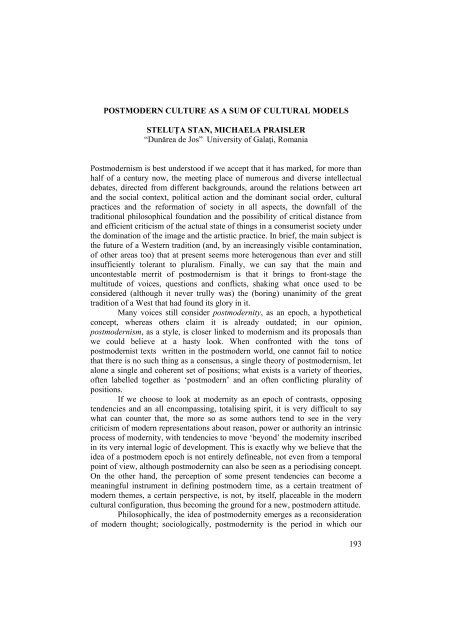culture, subculture and counterculture - Facultatea de Litere
culture, subculture and counterculture - Facultatea de Litere
culture, subculture and counterculture - Facultatea de Litere
Create successful ePaper yourself
Turn your PDF publications into a flip-book with our unique Google optimized e-Paper software.
POSTMODERN CULTURE AS A SUM OF CULTURAL MODELS<br />
STELUŢA STAN, MICHAELA PRAISLER<br />
“Dunărea <strong>de</strong> Jos” University of Galaţi, Romania<br />
Postmo<strong>de</strong>rnism is best un<strong>de</strong>rstood if we accept that it has marked, for more than<br />
half of a century now, the meeting place of numerous <strong>and</strong> diverse intellectual<br />
<strong>de</strong>bates, directed from different backgrounds, around the relations between art<br />
<strong>and</strong> the social context, political action <strong>and</strong> the dominant social or<strong>de</strong>r, cultural<br />
practices <strong>and</strong> the reformation of society in all aspects, the downfall of the<br />
traditional philosophical foundation <strong>and</strong> the possibility of critical distance from<br />
<strong>and</strong> efficient criticism of the actual state of things in a consumerist society un<strong>de</strong>r<br />
the domination of the image <strong>and</strong> the artistic practice. In brief, the main subject is<br />
the future of a Western tradition (<strong>and</strong>, by an increasingly visible contamination,<br />
of other areas too) that at present seems more heterogenous than ever <strong>and</strong> still<br />
insufficiently tolerant to pluralism. Finally, we can say that the main <strong>and</strong><br />
uncontestable merrit of postmo<strong>de</strong>rnism is that it brings to front-stage the<br />
multitu<strong>de</strong> of voices, questions <strong>and</strong> conflicts, shaking what once used to be<br />
consi<strong>de</strong>red (although it never trully was) the (boring) unanimity of the great<br />
tradition of a West that had found its glory in it.<br />
Many voices still consi<strong>de</strong>r postmo<strong>de</strong>rnity, as an epoch, a hypothetical<br />
concept, whereas others claim it is already outdated; in our opinion,<br />
postmo<strong>de</strong>rnism, as a style, is closer linked to mo<strong>de</strong>rnism <strong>and</strong> its proposals than<br />
we could believe at a hasty look. When confronted with the tons of<br />
postmo<strong>de</strong>rnist texts written in the postmo<strong>de</strong>rn world, one cannot fail to notice<br />
that there is no such thing as a consensus, a single theory of postmo<strong>de</strong>rnism, let<br />
alone a single <strong>and</strong> coherent set of positions; what exists is a variety of theories,<br />
often labelled together as ‘postmo<strong>de</strong>rn’ <strong>and</strong> an often conflicting plurality of<br />
positions.<br />
If we choose to look at mo<strong>de</strong>rnity as an epoch of contrasts, opposing<br />
ten<strong>de</strong>ncies <strong>and</strong> an all encompassing, totalising spirit, it is very difficult to say<br />
what can counter that, the more so as some authors tend to see in the very<br />
criticism of mo<strong>de</strong>rn representations about reason, power or authority an intrinsic<br />
process of mo<strong>de</strong>rnity, with ten<strong>de</strong>ncies to move ‘beyond’ the mo<strong>de</strong>rnity inscribed<br />
in its very internal logic of <strong>de</strong>velopment. This is exactly why we believe that the<br />
i<strong>de</strong>a of a postmo<strong>de</strong>rn epoch is not entirely <strong>de</strong>fineable, not even from a temporal<br />
point of view, although postmo<strong>de</strong>rnity can also be seen as a periodising concept.<br />
On the other h<strong>and</strong>, the perception of some present ten<strong>de</strong>ncies can become a<br />
meaningful instrument in <strong>de</strong>fining postmo<strong>de</strong>rn time, as a certain treatment of<br />
mo<strong>de</strong>rn themes, a certain perspective, is not, by itself, placeable in the mo<strong>de</strong>rn<br />
cultural configuration, thus becoming the ground for a new, postmo<strong>de</strong>rn attitu<strong>de</strong>.<br />
Philosophically, the i<strong>de</strong>a of postmo<strong>de</strong>rnity emerges as a reconsi<strong>de</strong>ration<br />
of mo<strong>de</strong>rn thought; sociologically, postmo<strong>de</strong>rnity is the period in which our<br />
193












